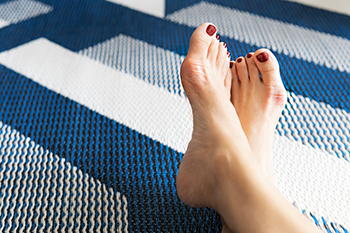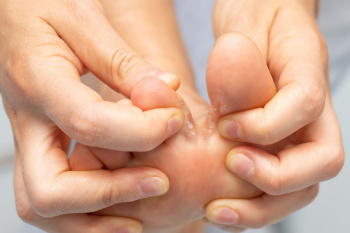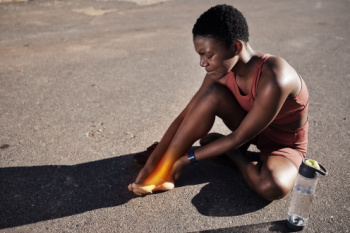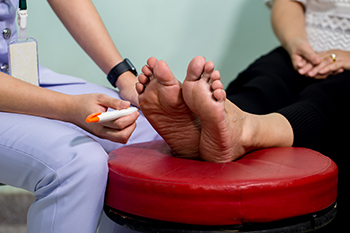Items filtered by date: March 2024
Conservative Treatments for Bunions
 Bunions are bony bumps that form on the joint at the base of the big toe, resulting from the misalignment of the foot's bones. This misalignment causes the big toe to lean toward the second toe, rather than pointing straight ahead, which creates a visible protrusion on the side of the foot. Bunions can cause pain, soreness, and swelling, especially when wearing tight-fitting shoes that press against the bump. There are conservative treatments for less severe cases, such as wearing wider and more comfortable shoes that provide ample space for the toes, and using padded shoe inserts to distribute pressure evenly across the foot. Special exercises that strengthen the foot and improve flexibility can also help manage bunion symptoms. These non-invasive treatments aim to relieve discomfort and prevent the progression of the bunion without the need for surgical intervention. However, more severe cases of bunions may warrant surgery. If you have a bunion, it is suggested that you schedule an appointment with a podiatrist to discuss treatment and measures you can take to prevent the condition from worsening.
Bunions are bony bumps that form on the joint at the base of the big toe, resulting from the misalignment of the foot's bones. This misalignment causes the big toe to lean toward the second toe, rather than pointing straight ahead, which creates a visible protrusion on the side of the foot. Bunions can cause pain, soreness, and swelling, especially when wearing tight-fitting shoes that press against the bump. There are conservative treatments for less severe cases, such as wearing wider and more comfortable shoes that provide ample space for the toes, and using padded shoe inserts to distribute pressure evenly across the foot. Special exercises that strengthen the foot and improve flexibility can also help manage bunion symptoms. These non-invasive treatments aim to relieve discomfort and prevent the progression of the bunion without the need for surgical intervention. However, more severe cases of bunions may warrant surgery. If you have a bunion, it is suggested that you schedule an appointment with a podiatrist to discuss treatment and measures you can take to prevent the condition from worsening.
If you are suffering from bunion pain, contact one of our podiatrists of Foot Care Centers of Palm Beach. Our doctors can provide the care you need to keep you pain-free and on your feet.
What Is a Bunion?
Bunions are painful bony bumps that usually develop on the inside of the foot at the joint of the big toe. As the deformity increases over time, it may become painful to walk and wear shoes. Women are more likely to exacerbate existing bunions since they often wear tight, narrow shoes that shift their toes together. Bunion pain can be relieved by wearing wider shoes with enough room for the toes.
Causes
- Genetics – some people inherit feet that are more prone to bunion development
- Inflammatory Conditions - rheumatoid arthritis and polio may cause bunion development
Symptoms
- Redness and inflammation
- Pain and tenderness
- Callus or corns on the bump
- Restricted motion in the big toe
In order to diagnose your bunion, your podiatrist may ask about your medical history, symptoms, and general health. Your doctor might also order an x-ray to take a closer look at your feet. Nonsurgical treatment options include orthotics, padding, icing, changes in footwear, and medication. If nonsurgical treatments don’t alleviate your bunion pain, surgery may be necessary.
If you have any questions, please feel free to contact our office located in Boynton Beach, FL . We offer the newest diagnostic and treatment technologies for all your foot care needs.
Causes and Symptoms of Athlete’s Foot

Athlete’s foot, or tinea pedis, is a common fungal skin infection. It can be recognized by raw, cracked, or scaly skin, affecting the skin between the toes. Other symptoms of athlete’s foot are redness, itching, and in some cases, a burning sensation. Athletes’s foot can happen to anyone who comes into direct contact with infected skin or contaminated surfaces, like bathroom floors and towels. Factors such as moist, sweaty feet, skin damage, and weakened immune systems increase susceptibility. For persistent or severe cases, a podiatrist can provide a tailored treatment plan to effectively manage athlete’s foot and prevent recurrence. If you have developed athlete’s foot, it is suggested that you schedule an appointment with a podiatrist for an exam and prescribed medication.
Athlete’s Foot
Athlete’s foot is often an uncomfortable condition to experience. Thankfully, podiatrists specialize in treating athlete’s foot and offer the best treatment options. If you have any questions about athlete’s foot, consult with one of our podiatrists from Foot Care Centers of Palm Beach. Our doctors will assess your condition and provide you with quality treatment.
What Is Athlete’s Foot?
Tinea pedis, more commonly known as athlete’s foot, is a non-serious and common fungal infection of the foot. Athlete’s foot is contagious and can be contracted by touching someone who has it or infected surfaces. The most common places contaminated by it are public showers, locker rooms, and swimming pools. Once contracted, it grows on feet that are left inside moist, dark, and warm shoes and socks.
Prevention
The most effective ways to prevent athlete’s foot include:
- Thoroughly washing and drying feet
- Avoid going barefoot in locker rooms and public showers
- Using shower shoes in public showers
- Wearing socks that allow the feet to breathe
- Changing socks and shoes frequently if you sweat a lot
Symptoms
Athlete’s foot initially occurs as a rash between the toes. However, if left undiagnosed, it can spread to the sides and bottom of the feet, toenails, and if touched by hand, the hands themselves. Symptoms include:
- Redness
- Burning
- Itching
- Scaly and peeling skin
Diagnosis and Treatment
Diagnosis is quick and easy. Skin samples will be taken and either viewed under a microscope or sent to a lab for testing. Sometimes, a podiatrist can diagnose it based on simply looking at it. Once confirmed, treatment options include oral and topical antifungal medications.
If you have any questions, please feel free to contact our office located in Boynton Beach, FL . We offer the newest diagnostic and treatment technologies for all your foot care needs.
Why Live with Pain and Numbness in Your Feet?
Men Need Foot Care Too

To maintain optimal foot health, men should incorporate care routines into their daily regimen. These practices are important for preventing common issues such as rough skin and nail problems. Regular moisturizing helps combat dryness and prevents calluses. Cleaning between the toes is important for preventing bacterial growth and conditions like athlete's foot. Proper footwear selection is also important, and this involves making sure shoes fit well and have soft padding to minimize friction and callus formation. Additionally, trimming toenails straight across and exfoliating feet regularly with a body scrub can help maintain overall foot health. Wearing sandals or shoes in communal areas like gyms and public showers is important to prevent fungal infections. Finally, incorporating body powder into the routine can aid in absorbing excess moisture and alleviating discomfort, particularly for those who lead active lifestyles. If you have persistent pain, skin issues, or an infection on your feet, it is suggested that you make an appointment with a podiatrist for an examination and any treatment deemed necessary.
Everyday foot care is very important to prevent infection and other foot ailments. If you need your feet checked, contact one of our podiatrists from Foot Care Centers of Palm Beach. Our doctors can provide the care you need to keep you pain-free and on your feet.
Everyday Foot Care
Often, people take care of their bodies, face and hair more so than they do for their feet. But the feet are a very important aspect of our bodies, and one that we should pay more attention to. Without our feet, we would not be able to perform most daily tasks.
It is best to check your feet regularly to make sure there are no new bruises or cuts that you may not have noticed before. For dry feet, moisturizer can easily be a remedy and can be applied as often as necessary to the affected areas. Wearing shoes that fit well can also help you maintain good foot health, as well as making it easier to walk and do daily activities without the stress or pain of ill-fitting shoes, high heels, or even flip flops. Wearing clean socks with closed shoes is important to ensure that sweat and bacteria do not accumulate within the shoe. Clean socks help to prevent Athlete’s foot, fungi problems, bad odors, and can absorb sweat.
If you have any questions please feel free to contact our office located in Boynton Beach, FL . We offer the newest diagnostic and treatment technologies for all your foot and ankle needs.
How Diabetes Affects the Feet

Living with diabetes brings a multitude of challenges, with one often overlooked aspect being the health of your feet. Diabetes can lead to significant complications in foot health, including ulcers, nerve damage, and infections. Uncontrolled diabetes can cause nerve damage, resulting in reduced sensation in the feet, which is a condition known as diabetic neuropathy. This loss of feeling can indicate that minor injuries or irritations may go unnoticed, and increases the likelihood of them turning into more severe problems like ulcers. Additionally, diabetes can damage the arteries supplying the nerves, furthering nerve damage and impairing circulation. Regular foot checks by a podiatrist are essential for individuals with diabetes. These visits will monitor foot health, identify early signs of complications, and guidance will be received on proper foot care techniques. If you have foot problems that may be the result of diabetes, it is suggested that you schedule regular visits to a podiatrist who is medically trained to manage this condition.
Diabetic foot care is important in preventing foot ailments such as ulcers. If you are suffering from diabetes or have any other concerns about your feet, contact one of our podiatrists from Foot Care Centers of Palm Beach. Our doctors can provide the care you need to keep you pain-free and on your feet.
Diabetic Foot Care
Diabetes affects millions of people every year. The condition can damage blood vessels in many parts of the body, especially the feet. Because of this, taking care of your feet is essential if you have diabetes, and having a podiatrist help monitor your foot health is highly recommended.
The Importance of Caring for Your Feet
- Routinely inspect your feet for bruises or sores.
- Wear socks that fit your feet comfortably.
- Wear comfortable shoes that provide adequate support.
Patients with diabetes should have their doctor monitor their blood levels, as blood sugar levels play such a huge role in diabetic care. Monitoring these levels on a regular basis is highly advised.
It is always best to inform your healthcare professional of any concerns you may have regarding your feet, especially for diabetic patients. Early treatment and routine foot examinations are keys to maintaining proper health, especially because severe complications can arise if proper treatment is not applied.
If you have any questions please feel free to contact our office located in Boynton Beach, FL . We offer the newest diagnostic and treatment technologies for all your foot and ankle needs.

